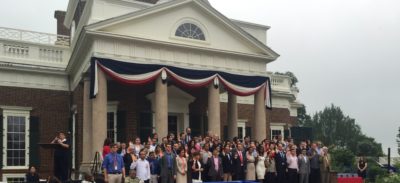
Every July 4, my family and I attend the naturalization ceremony at Monticello. It’s among the most inspiring events of the year, as new citizens from a wide variety of nations and cultures take their oaths to become Americans, and commit to protect this nation from all foes, whether foreign or domestic. It is a day that we take stock of our values—freedom, equality, diversity, inclusiveness, opportunity—and what makes us a special nation that serves as a beacon of hope across this globe.
Juxtapose this against the challenge we face as a community in the coming weeks, as hate groups hope to stamp a negative imprint on the city that we love. It is a serious challenge, though not as serious as those our forebearers faced when they created a new nation, or President Lincoln when he fought to save the Union, or Dr. King when he marshaled an army of nonviolent activists in the service of equality and opportunity. But it is a challenge nonetheless to who we are today as a community, and how we will present ourselves—both to those who seek to provoke and to those in the outside world simply looking for yet another example of the chaos, discord, and thoughtlessness in a country seemingly engulfed by it. [Read more…]


